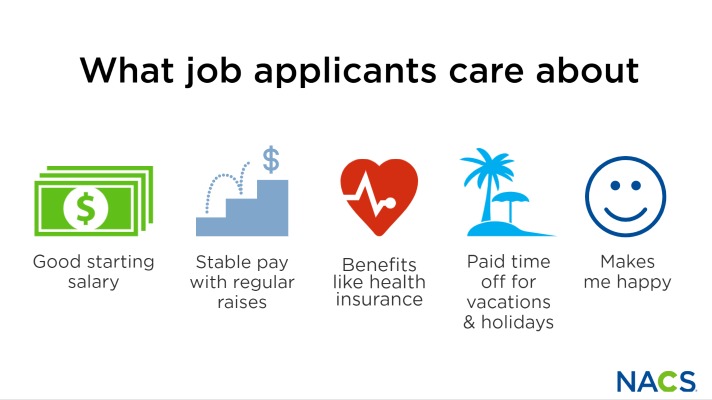If there’s one thing job applicants can agree on it’s that wages and benefits are important. But what else do they care about and what could that mean for how convenience retailers frame their job offers?
NACS surveyed potential job applicants asking them to rank a series of 20 job attributes using a method called maximum differential (MaxDiff) scaling. MaxDiff presents an understanding of not just the ranking of attributes but how strong those preferences are.
With MaxDiff ranking, the average for all responses is 100 points. Anything more than 100 is considered important to applicants, and anything above 150 points is very important.
The numbers below suggest that a focus on pay and benefits is important to get applicants interested in your company, which is not surprising:
- Good starting salary (234 points)
- Stable pay with regular raises (233 points)
- Benefits like health insurance or retirement plans (202 points)
- Paid time off for vacation and holidays (164 points)
- Makes me happy (150 points)

However, salary alone doesn’t tell the entire story. Applicants also want to be happy, the fifth highest-rated job attribute at 150 points. Although “makes me happy” is subjective, addressing this need can present opportunities to use different messages that frame a positive experience someone will have being employed at a convenience retail company, which is covered in the “Messages Applicants Want to Hear” section.
Job characteristics related to salary, benefits and happiness are considered the most compelling attributes for prospective convenience retail employees. Characteristics related to advancement, scheduling and interacting with coworkers also received strong interest.
- Has a clear, achievable path for advancement (97 points)
- Flexible hours (93 points)
- Relates to my interests (91 points)
- Convenience hours (87 points)
- Consistent schedule (83 points)
- Positive interactions with coworkers/colleagues (76 points)
Convenience store jobs provide flexibility, such as multiple shifts and different types of work, also scored well:
- Chance to help others (66 points)
- Short commute time (65 points)
- Positive interaction with customers/clients (60 points)
- Offers on-the-job training or technical skills (59 points)
- Employer helps pay to further education/develop specialized skills (55 points)
- Comfortable workspace (54 points)
- On-the-job-perks or employee discounts (54 points)
Applicants want jobs that do more than pay the bills; they want to make a difference in their community, which can be an important differentiator when compared to jobs that have roughly the same pay, benefits and general attributes.
There were two attributes that weren’t of interest to applicants:
- Relaxed, slow-paced environment (42 points)
- Active, fast-paced environment (27 points)
These two data points suggest that applicants are willing to work in both a fast- or slow-paced environment if their needs are met.
In summary, the MaxDiff exercise suggests that while increasing pay and benefits may not always be feasible, retailers could focus on highlighting the secondary attributes that speak more to the workplace culture and job opportunities. For example:
- Culture and transparency matter: Talk about company culture with prospective employees early in the interview process to communicate the company’s identity and values.
- Invest in employees: Benefits like health insurance, flexible hours, the option to work from home and paid vacation time are important, but also communicate other types of voluntary benefits that may help attract prospective employees, such as student loan assistance, child and/or senior care, wellness programs and/or identity theft protection.
- Walk the talk: Prospective employees want to know that they will have support from their colleagues to learn and grow, including leadership. Enlist company leaders to share their own personal experiences as they advanced their careers through the company’s training and development programs.
The following suggestions could also help prospective employees connect with a company’s social responsibility efforts:
- List the company’s foundation and charitable partners in job postings and on the company’s website. Also, call out efforts like raising money and awareness to fight childhood disease, children and families affected by illness, and efforts that encourage kids to live active lifestyles.
- If a company has a scholarship program, highlight its progress over the years, such as total scholarship dollars rewarded to students.
- Highlight sustainability strategies that tap into community pride like providing recycling bins at stores, using compostable foodservice packaging or participating in community clean-ups.
- Share employee community engagement efforts that help prevent hunger, such as collecting donations for local food banks and volunteering for activities that help people who are experiencing food insecurity.
In short, tell your story.